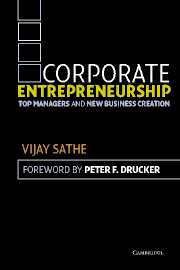Book contents
- Frontmatter
- Contents
- List of figures
- List of tables
- Foreword
- Preface
- List of abbreviations
- 1 Introduction
- 2 Why a consistent emphasis and approach for new business creation is beneficial but difficult to achieve
- I The business environment
- II The management culture
- III The corporate executives
- IV The division general manager
- 11 The DGM's personal assets
- 12 The DGM's motivation and strategy for new business creation
- 13 Building corporate support for new business creation
- 14 Leading the division for new business creation
- V The division and its top management team
- VI Putting it all together
- Notes
- Bibliography
- Index
11 - The DGM's personal assets
Published online by Cambridge University Press: 22 September 2009
- Frontmatter
- Contents
- List of figures
- List of tables
- Foreword
- Preface
- List of abbreviations
- 1 Introduction
- 2 Why a consistent emphasis and approach for new business creation is beneficial but difficult to achieve
- I The business environment
- II The management culture
- III The corporate executives
- IV The division general manager
- 11 The DGM's personal assets
- 12 The DGM's motivation and strategy for new business creation
- 13 Building corporate support for new business creation
- 14 Leading the division for new business creation
- V The division and its top management team
- VI Putting it all together
- Notes
- Bibliography
- Index
Summary
This chapter examines how the personal assets of the division general manager (DGM) influence new business creation. These include personality, experience, and leverage with the corporate executives (Table 11.1).
Personality
The DGMs who participated in this study were requested to complete a set of personality tests because research regarding entrepreneurs suggested several important dimensions. These tests were chosen with two criteria in mind: (1) each test had to be relatively simple to administer, and (2) all the tests combined had to take less than one hour to complete. The DGMs were generous with their time, but there were limits to their patience with such tests. DGM comparisons based on these personality tests and the implications for new business creation are described below.
Extroverted versus introverted
DGMs either were balanced between extroverted and introverted (March, Stewart, and McVay) or were extroverted (Walker, Smith, Gibbons, and Carter). This external orientation aided their capacity to perceive new business opportunities, and to gain the support of others in order to pursue them.
March's successor, Thorngate, was the only introvert. He realized that his introversion was dampening his capacity to perceive new business opportunities, as well as his ability to get others excited about these opportunities, and he began to force himself to visit more customers as the study ended.
Intuitive versus sensing
People who are “intuitive” have an inclination to look for possibilities and relationships whereas those who are “sensing” have an inclination to work with known facts.
- Type
- Chapter
- Information
- Corporate EntrepreneurshipTop Managers and New Business Creation, pp. 149 - 165Publisher: Cambridge University PressPrint publication year: 2003



